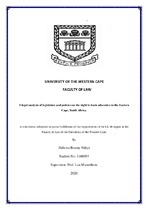A legal analysis of legislation and policies on the right to basic education in the Eastern Cape, South Africa
| dc.contributor.advisor | Mwambene, Lea | |
| dc.contributor.author | Ndayi, Zoliswa Beauty | |
| dc.date.accessioned | 2021-04-06T08:08:31Z | |
| dc.date.available | 2021-04-06T08:08:31Z | |
| dc.date.issued | 2020 | |
| dc.identifier.uri | http://hdl.handle.net/11394/8129 | |
| dc.description | Magister Legum - LLM | en_US |
| dc.description.abstract | The right to a basic education is recognised as an essential right in international and regional law, with numerous instruments regulating it.1 There are soft laws, in the form of General Comment documents, which provide guidelines to interpreting this right.2 Among these instruments, for example, the International Covenant on Social, Economic and Cultural Rights (hereafter referred to as ‘the ICESCR’) and the African Charter on Human and People’s Rights (hereafter referred to as ‘the ACHPR’) implore member states to ensure that every child within their jurisdiction is able to gain access to education.3 The ICESCR acknowledges that basic education as a socio-economic right is realisable overtime, its full realisation dependent on the availability of state resources. | en_US |
| dc.language.iso | en | en_US |
| dc.publisher | University of the Western Cape | en_US |
| dc.subject | African charter | en_US |
| dc.subject | Eastern Cape | en_US |
| dc.subject | International law | en_US |
| dc.subject | Policy | en_US |
| dc.subject | Legislation | en_US |
| dc.subject | Discrimination | en_US |
| dc.title | A legal analysis of legislation and policies on the right to basic education in the Eastern Cape, South Africa | en_US |
| dc.rights.holder | University of the Western Cape | en_US |

